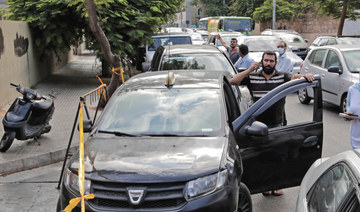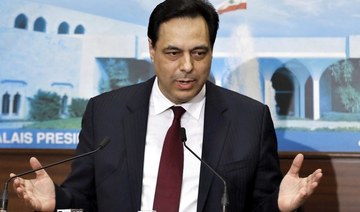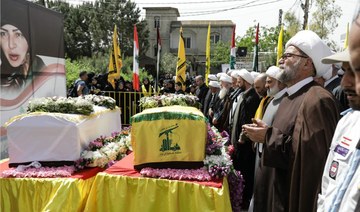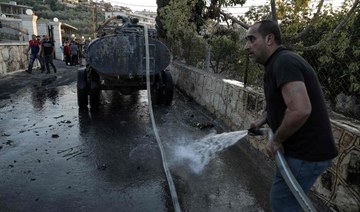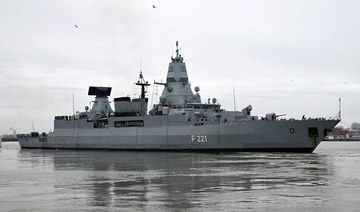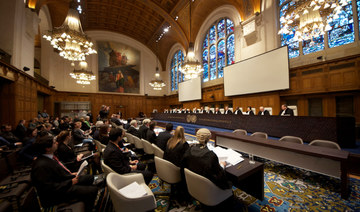BEIRUT: A trove of leaked documents confirmed that for years, Lebanon’s politicians and bankers have stowed wealth in offshore tax havens and used it to buy expensive properties.
A galling revelation for masses of newly impoverished Lebanese, caught in one of the world’s worst economic meltdowns in decades.
Some of the newly outed holders of offshore accounts belong to the same ruling elite that is being blamed for the collapse and for derailing the lives of ordinary Lebanese who have lost access to savings and now struggle to get fuel, electricity and medicine.
Bold-faced names in the leaked documents include the longtime central bank governor, a pivotal figure in the failed policies that helped trigger the financial crisis, as well as Prime Minister Najib Mikati and his predecessor.
The documents, named the “Pandora Papers,” were examined by the International Consortium of Investigative Journalists, with the first findings released on Sunday. The ICIJ report exposes the offshore secrets of wealthy elites from more than 200 countries and territories.
It was based on a review of nearly 11.9 million records obtained from 14 firms that provide services in setting up offshore firms and shell companies. Clients of such firms are often trying to hide their wealth and financial activities.
Setting up an offshore company is not illegal, but reinforces the perception that the wealthy and powerful play by different rules — a particularly upsetting notion for many Lebanese.
The papers show how members of the political class were sending wealth abroad for years, even as they urged people to deposit money in Lebanon’s banks, assuring them that it was safe, said Alia Ibrahim, a Lebanese journalist.
“We are not talking about regular citizens,” said Ibrahim, a co-founder of Daraj, a Beirut-based independent digital media platform, and one of scores of journalists across the world who worked with ICIJ on the investigation into the documents.
“These are politicians who served in public office for years, and they are partly responsible for the current crisis Lebanon is going through,” she said.
Lebanon is in the midst of what the World Bank says is one of the world’s worst economic meltdowns in the past 150 years. More than 70 percent of the population has been thrown into poverty, their savings nearly wiped out in the crisis that began in late 2019 and was in part caused by decades of corruption and mismanagement by the political class.
Hundreds of thousands of people staged nationwide protests against corruption starting in late 2019. Yet two years later the same politicians still run the country in the same way, protected by the sectarian-based system.
One of the protesters, Samir Skaff, said that the Lebanese are not surprised to be told that the political class “is made up of a bunch of thieves.”
“We have been saying that for years,” he said.
Offshore companies, though not illegal, can be used to elude taxes or hide illicitly gained money. The leaks only add further confirmation to what Lebanese have long said about their ruling class — though repeated reports of graft or illicit activity in the past have failed to bring change.
One of the 14 firms listed by ICIJ as providing offshore services is Trident Trust, with 346 Lebanese clients making up the largest group, more than double the second-place country, Britain.
One focus of the revelations is Riad Salameh, who has been Lebanon’s central bank governor for nearly 30 years.
Daraj reported that the documents showed Salameh founded a company called AMANIOR, based in the British Virgin Islands, in 2007. He is listed as its full owner and sole director, which Daraj said appeared to violate Lebanese laws forbidding the central bank governor from activity in any enterprise.
Salameh’s office told The Associated Press that the central bank governor has no comment on the documents. ICIJ quoted him as saying that he declares his assets and has complied with reporting obligations under Lebanese law.
Salameh, 70, is being investigated in Switzerland and France for potential money laundering and embezzlement. Local media reported over the past months that Salameh and his brother as well as one of his aides have been involved in illegal businesses, including money transfers abroad despite the capital controls imposed at home. Salameh had denied making such transfers.
Other documents showed that Marwan Kheireddine, chairman of Lebanon’s Al-Mawarid Bank, was involved in setting up a flurry of offshore businesses in the months just before the economic crisis hit in late 2019. In November that year, his bank and others began imposing capital controls that meant Lebanese could pull very little money out of their accounts even as the currency crashed, wrecking their savings’ value.
The Pandora Papers reveal that in 2019, Kheireddine received control of an offshore firm in the British Virgin Islands, which he then used to buy a $2 million yacht.
In January 2019, he and his brother set up four firms in Britain on the same day, all based at the same London address, and all registered as “small companies,” which Daraj said meant they are exempt from auditing. In 2020, Kheireddine bought a $9.9 million New York penthouse sold by American actress Jennifer Lawrence, Lebanese media reported at the time.
Kheireddine is a former Cabinet minister and a senior member of the Lebanese Democratic Party. He did not respond to calls and a text message by the AP.
Prime Minister Mikati, a businessman who formed a new government last month, has owned a Panama-based offshore company since the 1990s. He used it in 2008 to buy property in Monaco worth more than $10 million, Daraj reported from the documents.
The leaked documents also show that his son Maher was a director of at least two British Virgin Islands-based companies, which his father’s Monaco-based company, M1 Group, used to obtain an office in central London.
Mikati released a statement saying his family fortune was amassed prior to his involvement in politics and was “compliant with global standards” and regularly scrutinized by auditors. Contacted by the AP, Mikati’s media adviser Fares Gemayel said he had no comment.
Speaking to Daraj, Maher Mikati said it was common for people in Lebanon to use offshore companies “due to the easy process of incorporation” and denied the purpose was to evade taxes.
Mikati’s predecessor as prime minister, Hassan Diab, was a co-owner of a shell company in the British Virgin Islands, Daraj reported.
Diab’s office said in a statement Monday that he helped establish the company in 2015, but it did not do any business and he resigned from the firm and gave up his shares in 2019.
“Is the setting up of a company against the law?” the statement said.
Diab’s government resigned days after a massive Aug. 4, 2020, blast in Beirut that killed and injured hundreds and destroyed the city’s port and nearby neighborhoods. Diab was charged with intentional killings and negligence in the case. He denies any wrongdoing but has refused to be questioned by the judge leading the investigation.
As Lebanese got poorer, politicians stowed wealth abroad
https://arab.news/z5q8b
As Lebanese got poorer, politicians stowed wealth abroad
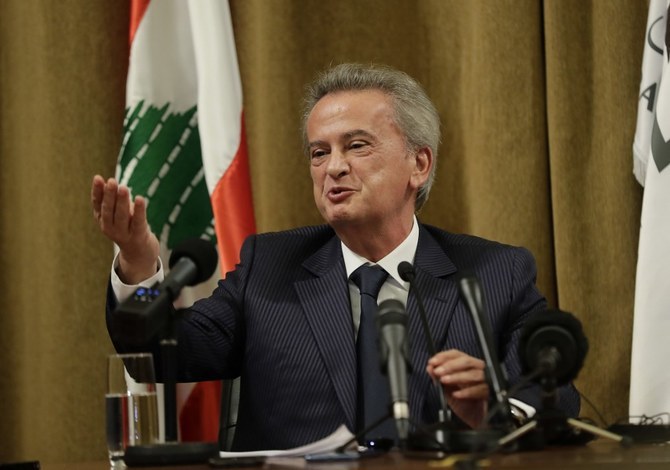
- Some of the newly outed holders of offshore accounts belong to the same ruling elite that is being blamed for the collapse
- Bold-faced names in the leaked documents include the longtime central bank governor, Riad Salameh, Prime Minister Najib Mikati and his predecessor
Teenage Iranian protester Nika Shakarami ‘was killed by police’
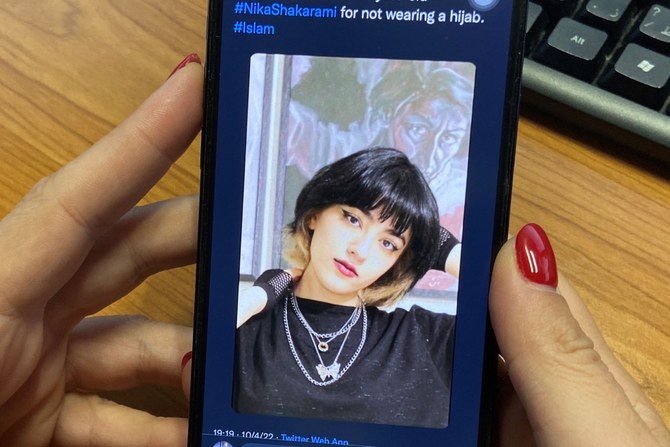
JEDDAH: Iranian authorities ordered the arrest of activists and journalists on Wednesday after a leaked Revolutionary Guard report revealed that secret police had sexually assaulted and killed a teenage girl during Iran’s “hijab protests” in 2022.
Nika Shakarami, 16, died during demonstrations over the death in police custody of Mahsa Amini, who had been detained for wearing her headscarf incorrectly.
Shakarami’s death also sparked widespread outrage. Authorities said she died after falling from a tall building, but her mother said the girl had been beaten.
In a report prepared for the Islamic Revolutionary Guard Corps and leaked to the BBC, investigators said Shakarami had ben arrested by undercover security forces who molested her, then killed her with batons and electronic stun guns when she struggled against the attack.
Iran’s judiciary said on Wednesday that the BBC story was “a fake, incorrect and full-of-mistakes report,” without addressing any of the alleged errors.
“The Tehran Prosecutor’s Office filed a criminal case against these people,” a spokesman said, with charges including “spreading lies” and “propaganda against the system.” The first charge can carry up at a year and a half in prison and dozens of lashes, while the second can bring up to a year’s imprisonment.
It was not clear if prosecutors had charged the three BBC journalists who wrote the report. Those associated with the BBC’s Persian service have been targeted for years by Tehran and barred from working in the country since its disputed 2009 presidential election and Green Movement protests.
Iranian Interior Minister Ahmad Vahidi said the BBC report was an effort to “divert attention” from protests at American universities over the Israel-Hamas war. “The enemy and their media have resorted to false and far-fetched reports to conduct psychological operations,” he said.
How fierce but undeclared Israel-Hezbollah war is hurting civilians in south Lebanon
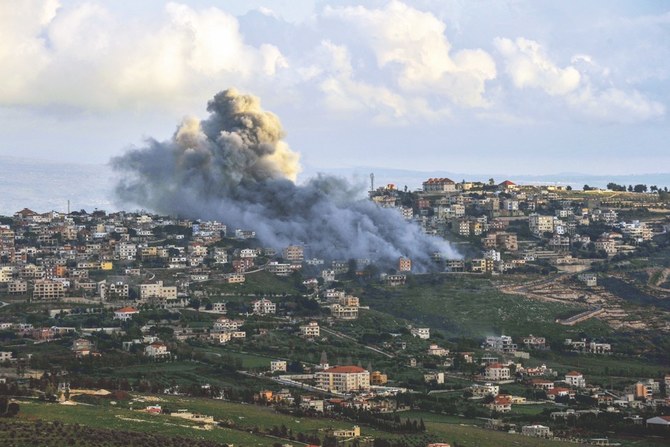
- IDF and Iran-backed Lebanese group began trading fire across the border following Oct. 7 Hamas-led attack
- Farming communities in southern Lebanon have seen their fields burned, homes destroyed by Israeli strikes
BEIRUT: For more than six months, an undeclared war has been raging along Lebanon’s southern border with Israel, leading to the displacement of some 92,000 Lebanese citizens and the destruction of homes, businesses and agriculture.
The front line of this conflict between Hezbollah and the Israeli armed forces stretches some 850 km, incorporating parts of the UN-monitored Blue Line, with missiles fired by both sides reaching up to 15 km into their respective territories.
Although the exchanges have remained relatively contained, Israeli attacks have caused civilian deaths, damaged and destroyed homes, infrastructure and farmland, and ignited forest fires. Civilians on both sides of the border have been displaced.
“Our town is right on the border, and there are now only 100 out of 1,000 residents, and the rest are those who are unable to secure an alternative livelihood,” Jean Ghafri, mayor of Alma Al-Shaab, a predominantly Christian village in the Tyre District, told Arab News.
“So far, the shelling has destroyed 94 houses, and 60 percent of the olive groves, mango, and avocado orchards, vineyards, olive and carob trees have been burned, and some of the olive trees that were burned are 300 years old.”
Most of the people in the border region are Shiite. The rest are Sunni, Druze and Christians, along with dozens of Syrian refugee families, some 10,000 troops of UNIFIL, or UN Interim Force in Lebanon, and a few thousand Lebanese soldiers.
Members of Lebanon’s Iran-backed Hezbollah militia began launching rocket attacks against Israel on Oct. 8, a day after the Hamas-led assault on southern Israel triggered the war in Gaza.

Since then, Hezbollah and the Israeli military have traded fire along the shared border, raising fears that the Gaza conflict could spill over and engulf Lebanon in a devastating war reminiscent of the 2006 Israeli invasion.
“The town, although it is in a conflict zone, did not witness this level of direct destruction in the 2006 war,” said Ghafri. “It is impossible to know the exact damage because the area is considered a war zone. Those who are still there are receiving food rations from religious or international organizations.”
Al-Dahira is another town that has come under heavy shelling on an almost daily basis since the conflict began. It was from its nearby border that Hezbollah began its military assault on Oct. 8.
Its mayor, Abdullah Ghuraib, counts “17 houses that have been completely destroyed and dozens of houses that are no longer habitable due to the force of the shelling.”
He said: “There is only one woman, Radhya Atta Sweid, 75 years old, who insisted on staying in her house and not leaving. She had stayed in her house during the 2006 war and her brother’s wife, who was with her in the house, was killed and she remained there.”
Hassan Sheit, the mayor of Kfarkela, a village that is only a stone’s throw from the Israeli border, painted a similar picture of destruction and displacement.
“The material losses are great. This is a town where people live in summer and winter, of which only 7 percent of the 6,000 inhabitants remain,” Sheit told Arab News.
“The displacement from the town caused people to be homeless, living with relatives and in rented apartments, and living on aid from civil society and Hezbollah, which varies between financial and in-kind assistance.

“The town lost 15 martyrs as a result of the Israeli bombardment. What is happening today in the town was not done in the 2006 war.”
Thousands of families from towns and villages across southern Lebanon fled as soon as the first exchanges began. Many of these communities are now ghost towns, having lost some 90 percent of their residents.
The displaced, most of them women and children, have moved to towns further away from the border, including areas around Tyre, Nabatieh, Zahrani, Sidon, Jezzine and even the southern suburbs of Beirut, where they rent or stay with relatives.
Those without the means to support themselves have been forced to reside in shelters established by local authorities. These shelters, most of them in school buildings, are concentrated in the city of Tyre, within easy reach of their towns and villages.
This protracted displacement has been accompanied by economic hardship brought on by the financial crisis that struck Lebanon in late 2019. To make matters worse, many south Lebanese have lost their livelihoods as a result of their displacement.

Ghafri, the mayor of Alma Al-Shaab, said several displaced residents had said expenses in Beirut were different from those in the villages. One person had told him residents “do not work and therefore no income reaches them, except for in-kind assistance from civil and international organizations and from wealthy expatriates.
“There are no political parties in Alma Al-Shaab, no militants, and all its people are in favor of the Lebanese state and refuse to allow their town to be used as a battlefield. People are worried about their future, and I am trying to convey this position to Hezbollah.”
Those who initially benefited from reduced or rent-free arrangements are now being asked to pay more or move on. The rent for some apartments has reportedly jumped from $100 to $1,000 per month, placing a significant strain on household savings and incomes.
INNUMBERS
• 92,621 Individuals displaced from south Lebanon by hostilities as of April 16 (DTM).
• 1,324 Casualties reported, including 340 deaths, as of April 18 (OHCHR, MoPH).
According to media reports, Hezbollah has intervened in support of displaced households, calling on apartment owners in the south and in Beirut’s southern suburbs to cap their rents, and providing families with financial aid.
Families who spoke to local media said Hezbollah provided a quarterly payment of $1,000 for three months, then reduced the amount to an average of $300 per month, covering about 15,000 displaced families.
Like other displaced households, the people of Al-Dahira have complained of “running out of money and relatives’ discomfort with their presence,” said the town’s mayor Ghuraib.

“Two days ago, we came to the town to pay our respects to someone who died. We entered the town in a hurry and quickly inspected our homes, and I saw men crying about the loss of their livelihoods and possessions.
“The people of Al-Dahira make a living from growing tobacco, olives and grains, but the (crops of the) previous season burned down and now the land is on fire.
“The problem is that the situation is getting worse day by day. People’s lives have been turned upside down. If the war drags on, the land will die. The Israelis are deliberately turning it into a scorched earth.”
What is undeniable is that the displacement of entire farming communities has brought the once bountiful agricultural economy in many areas to the brink of collapse.
“The people of Aitaroun make their living from agriculture, especially tobacco farming, and the losses today are great,” Salim Murad, the mayor of the southeastern border town, told Arab News.

“There are 40 dairy cattle farmers with about 500 cows and two factories for making cheese and dairy products. With the displacement, production stopped and the displaced people most likely sold their cows or slaughtered them, which means that another link of agricultural production has been destroyed.
“There were 2,200 beehives distributed along the border, as the area is rich and varied in pasture, but these hives were completely lost, and farmers lost the olive season, and these orchards lost their future suitability for cultivation.”
It is unclear whether any kind of compensation will be paid to these farming households once the violence ends. Although the situation appears bleak, Kfarkela mayor Sheit is confident the region’s resilient communities will bounce back.
“Once the war stops, people will return to their homes and rebuild them,” he said. “Because we are the owners of the land.”

US military destroys Houthi drone boat
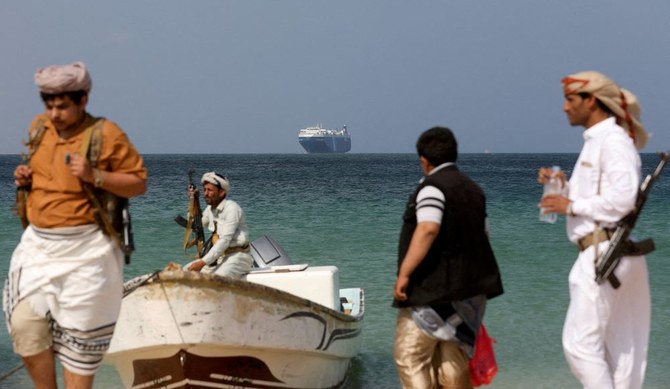
- CENTCOM: It was determined the USV presented an imminent threat to U.S., coalition forces, and merchant vessels in the region
- Houthi leader Mohammed Ali Al-Houthi: Yemen’s strategic stockpile of deterrent weapons is much much larger than you would imagine
AL-MUKALLA: The US Central Command said that its forces have destroyed an explosive-laden and remotely operated boat in a Houthi-held area of Yemen, as the Yemeni militia reaffirmed threats to increase their Red Sea ship campaign unless Israel ceases its assault in Gaza.
In a statement on X on Wednesday morning, the US military said it destroyed an uncrewed surface vessel at approximately 1:52 p.m. (Sanaa time) on Tuesday in Yemen after determining that it posed a threat to the US and its allies, as well as international commercial and naval ships in international waters off Yemen’s coasts.
“It was determined the USV presented an imminent threat to U.S., coalition forces, and merchant vessels in the region. These actions are taken to protect freedom of navigation and make international waters safer and more secure for U.S., coalition, and merchant vessels,” USCENTCOM said.
In Yemen, the Houthis said that the US and UK conducted one attack on the Red Sea Ras Essa in the western province of Hodeidah on Tuesday but did not specify the target area or the extent of the damage.
During the last seven months, the Houthis have seized a commercial ship, sunk another, and fired hundreds of drones, ballistic missiles, and remotely controlled drones at US, UK, Israeli, and other international ships in the Red Sea, Bab Al-Mandab Strait, and Gulf of Aden. The Houthis claim they solely target Israel-linked and Israel-bound ships to push Israel to let humanitarian supplies into the Gaza Strip. They also added ships tied to the US and the UK to their list of targets after the two nations launched strikes against areas of Yemen under their control.
On Tuesday, the UK Maritime Trade Operations, which tracks ship attacks, advised ships passing through the Indian Ocean to exercise caution after receiving a report of a drone attacking a commercial ship 170 nautical miles southeast of Yemen’s Socotra island and approximately 300-400 nautical miles southeast of the Horn of Africa overnight on April 26. “The vessel and crew are reported safe and the vessel is proceeding to its next port of call,” the UK agency said.
Similarly, the Houthi Supreme Political Council warned the US on Tuesday against conducting a fresh wave of strikes against regions under their control in punishment for the militia’s recent increase in assaults on ships in the Red Sea. “The consequences of any escalation will not stop at Yemen’s borders, nor will they impact the noble Yemeni stance, the steadfastness of the Yemeni people, or the heroism of the military forces at all levels,” Houthi council members said in a statement.
On Tuesday, Houthi leader Mohammed Ali Al-Houthi issued the same warning to the US, claiming to possess huge military capabilities that would be utilized to counter any future US military strikes. “Do not play with fire. Yemen’s strategic stockpile of deterrent weapons is much much larger than you would imagine,” Al-Houthi said.
The Houthis said this week that they are aware that the US is ready to unleash a fresh round of bombings on Yemeni territories under their control, after the militia’s escalating assault against ships in the Red Sea.
Lebanese Christian leader says Hezbollah’s fighting with Israel has harmed Lebanon

- Samir Geagea of the Lebanese Forces Party said Hezbollah should withdraw from areas along the border with Israel
- The Lebanese army should deploy in all points where militants of the Iran-backed group have taken positions
`MAARAB, Lebanon: The leader of a main Christian political party in Lebanon blasted the Shiite militant group Hezbollah for opening a front with Israel to back up its ally Hamas, saying it has harmed Lebanon without making a dent in Israel’s crushing offensive in the Gaza Strip.
In an interview with AP on Tuesday night, Samir Geagea of the Lebanese Forces Party said Hezbollah should withdraw from areas along the border with Israel and the Lebanese army should deploy in all points where militants of the Iran-backed group have taken positions.
His comments came as Western diplomats try to broker a de-escalation in the border conflict amid fears of a wider war.
Hezbollah began launching rockets toward Israeli military posts on Oct. 8, the day after Hamas-led militants stormed into southern Israel in a surprise attack that sparked the crushing war in Gaza.
The near-daily violence has mostly been confined to the area along the border, and international mediators have been scrambling to prevent an all-out war. The fighting has killed 12 soldiers and 10 civilians in Israel. More than 350 people have been killed in Lebanon including 273 Hezbollah fighters and more than 50 civilians.
“No one has the right to control the fate of a country and people on its own,” Geagea said in his heavily guarded headquarters in the mountain village of Maarab. “Hezbollah is not the government in Lebanon. There is a government in Lebanon in which Hezbollah is represented.” In addition to its military arm, Hezbollah is a political party.
Geagea, whose party has the largest bloc in Lebanon’s 128-member parliament, has angled to position himself as the leader of the opposition against Hezbollah.
Hezbollah officials have said that by opening the front along Israel’s northern border, the militant group has reduced the pressure on Gaza by keeping several Israeli army divisions on alert in the north rather than taking part in the monthslong offensive in the enclave.
“All the damage that could have happened in Gaza ... happened. What was the benefit of military operations that were launched from south Lebanon? Nothing,” Geagea said, pointing the death toll and massive destruction in Lebanon’s border villages.
Israel’s war against Hamas in Gaza has killed more than 34,000 Palestinians, caused wide destruction and displaced hundreds of thousands to the city of Rafah along Egypt’s border. Israel’s Prime Minister Benjamin Netanyahu vowed Tuesday to launch an offensive into the southern Gaza city of Rafah despite international calls for restraint.
Geagea said Hezbollah aims through the ongoing fighting to benefit its main backer, Iran, by giving it a presence along Israel’s border and called for the group to withdraw from border areas and Lebanese army deploy in accordance with a UN Security Council resolution that ended the 34-day Israel-Hezbollah war in 2006.
Geagea also discussed the campaign by his party to repatriate Syrian refugees who fled war into Lebanon.
Those calls intensified after a Syrian gang was blamed for last month’s killing of Lebanese Forces official Pascal Suleiman, allegedly in a carjacking gone wrong, although many initially suspected political motives.
Lebanon, with a total population of around 6 million, hosts what the UN refugee agency says are nearly 785,000 UN-registered Syrian refugees, of which 90 percent rely on aid to survive. Lebanese officials estimate there may be 1.5 million or 2 million, of whom only around 300,000 have legal residency.
Human rights groups say that Syria is not safe for mass returns and that many Syrians who have gone back — voluntarily or not — have been detained and tortured.
Geagea, whose party is adamantly opposed to the government of President Bashar Assad in Syria, insisted that only a small percentage of Syrians in Lebanon are true political refugees and that those who are could go to opposition-controlled areas of Syria.
The Lebanese politician suggested his country should follow in the steps of Western countries like Britain, which passed controversial legislation last week to deport some asylum seekers to Rwanda.
“In Lebanon we should tell them, guys, go back to your country. Syria exists,” said Geagea, who headed the largest Christian militia during Lebanon’s 1975-90 civil war.
Turkiye to join South Africa’s genocide case against Israel at World Court, minister says
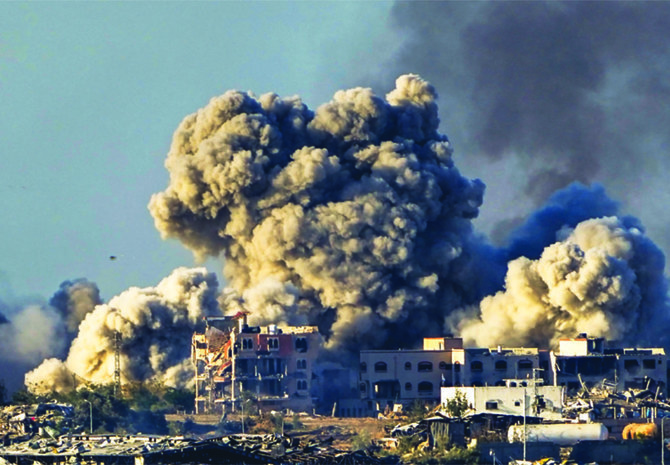
- “Turkiye will continue to support the Palestinian people in all circumstances,” Fidan said
- In January, President Tayyip Erdogan said that Turkiye was providing documents for the case at the ICJ
ISTANBUL: Turkish Foreign Minister Hakan Fidan said on Wednesday that Turkiye would join in South Africa’s genocide case against Israel at the International Court of Justice (ICJ).
“Upon completion of the legal text of our work, we will submit the declaration of official intervention before the ICJ with the objective of implementing this political decision,” Fidan said in a joint press conference with Indonesia’s Foreign Minister Retno Marsudi in Ankara.
“Turkiye will continue to support the Palestinian people in all circumstances,” he said.
The ICJ ordered Israel in January to refrain from any acts that could fall under the Genocide Convention and to ensure its troops commit no genocidal acts against Palestinians, after South Africa accused Israel of state-led genocide in Gaza.
In January, President Tayyip Erdogan said that Turkiye was providing documents for the case at the ICJ, also known as the World Court.
Israel and its Western allies described the allegation as baseless. A final ruling in South Africa’s ICJ case in The Hague could take years.



